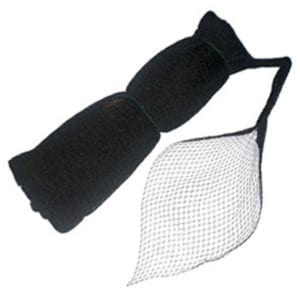
by johnnymarin | Feb 8, 2019 | Pigeon Patrol's Services
 There are some weird things that happen in Florida – after all, that is the foundation of the entire Florida Man subReddit, so is it really that shocking that a video has surfaced of a man catching pigeons in a net? Probably not for most.
There are some weird things that happen in Florida – after all, that is the foundation of the entire Florida Man subReddit, so is it really that shocking that a video has surfaced of a man catching pigeons in a net? Probably not for most.
The majority of questions surrounding the video is about what the man plans on doing with the birds. Although the video posted on World Star HipHop is pretty low quality and only just over 30 seconds in length, you can clearly see a man standing near a group of pigeons with something in his hand. It is soon revealed that “something” is a net that he throws over the birds – successfully catching several.
The video cuts off with the man putting the birds in the back of a vehicle. It is not clear if it is his vehicle or someone else’s – but we would put money on it being his. There is no further information on who the mystery bird man is, so that is also up to speculation. Knowing the internet his identity will not remain a secret for very long.
As for the legality of this man’s actions – well, according to the Chicago Tribune, it is not illegal to catch and eat a city pigeon unless it happens to be someone’s trained homing pigeon.
With that being said, a lot of people are assuming he was catching his dinner.
About Pigeon Patrol:
Pigeon Patrol Products & Services is the leading manufacturer and distributor of bird deterrent (control) products in Canada. Pigeon Patrol products have solved pest bird problems in industrial, commercial, and residential settings since 2000, by using safe and humane bird deterrents with only bird and animal friendly solutions. At Pigeon Patrol, we manufacture and offer a variety of bird deterrents, ranging from Ultra-flex Bird Spikes with UV protection, Bird Netting, 4-S Gel and the best Ultrasonic and audible sound devices on the market today.
Voted Best Canadian wholesaler for Bird Deterrent products four years in a row.
Contact Info: 1- 877– 4– NO-BIRD (www.pigeonpatrol.ca)
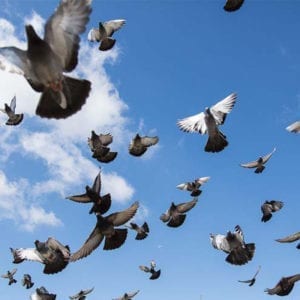
by johnnymarin | Feb 7, 2019 | Bird Deterrent Products
 Strategic retreat is sometimes the best offense. Citizens of Hyderabad are doing just that as ballooning pigeon population has taken over the city. “We are shelling out ₹2,000 per apartment to get the netting done. As we have 90 apartments, we have bargained the price down to ₹ 9 per sq ft,” says G. Ravi Kiran, a resident of an apartment complex in Hyderguda. “We have been forced to go for the netting as almost all the surrounding apartments have fixed the mesh which has lead to a rise in the number of pigeons frequenting our apartment,” he says. While feeding places have multiplied throughout the city over the past few years, more and more pigeons are taking over unlikely roosting places. “We found a pair and a small chick on the V-junction of a drainage pipe. There was almost no nest except a few sticks,” says Nirmala K., who lives in an apartment complex in Rama Krishna Nagar.
Strategic retreat is sometimes the best offense. Citizens of Hyderabad are doing just that as ballooning pigeon population has taken over the city. “We are shelling out ₹2,000 per apartment to get the netting done. As we have 90 apartments, we have bargained the price down to ₹ 9 per sq ft,” says G. Ravi Kiran, a resident of an apartment complex in Hyderguda. “We have been forced to go for the netting as almost all the surrounding apartments have fixed the mesh which has lead to a rise in the number of pigeons frequenting our apartment,” he says. While feeding places have multiplied throughout the city over the past few years, more and more pigeons are taking over unlikely roosting places. “We found a pair and a small chick on the V-junction of a drainage pipe. There was almost no nest except a few sticks,” says Nirmala K., who lives in an apartment complex in Rama Krishna Nagar.
This panic is turning out to be a money-spinner for a clutch of entrepreneurs who have created a business opportunity by covering balconies, ventilator shafts and common areas with pigeon netting. “We are using nets with 40 mm holes to keep out pigeons. The demand is high. We have already covered about 1,000 apartment blocks over the past two years,” says Maitresety Madhav, who took up netting business three years ago.
“If netting is with 1.5 mm thread, the guarantee is for three years and if it is 2.5 mm thread, we guarantee it for seven years,” informs Mr. Madhav.
“I worked in Bengaluru for two years and have set up my own operations in Hyderabad now. We have even covered a temple with pigeon netting,” says Salman Raju, who says the cost varies according to the thickness of the thread.
The Greater Hyderabad Municipal Corporation (GHMC) is caught out of the game, as the feeding spots have sprouted all over the city. From a traffic island at Ameerpet to a parking spot at Masab Tank to the disused Mussalam Jung Bridge in the old city, pigeon feeding spots have multiplied.
“We have put signages in bigger parks, but people still feed pigeons in smaller parks. We are trying to tell people not to stop feeding pigeons,” said an official from Urban Biodiversity wing of the GHMC.
About Pigeon Patrol:
Pigeon Patrol Products & Services is the leading manufacturer and distributor of bird deterrent (control) products in Canada. Pigeon Patrol products have solved pest bird problems in industrial, commercial, and residential settings since 2000, by using safe and humane bird deterrents with only bird and animal friendly solutions. At Pigeon Patrol, we manufacture and offer a variety of bird deterrents, ranging from Ultra-flex Bird Spikes with UV protection, Bird Netting, 4-S Gel and the best Ultrasonic and audible sound devices on the market today.
Voted Best Canadian wholesaler for Bird Deterrent products four years in a row.
Contact Info: 1- 877– 4– NO-BIRD (www.pigeonpatrol.ca)
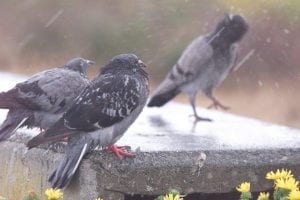
by johnnymarin | Feb 6, 2019 | Pigeons in the News
 A driver has been hit with a £158 ($200) parking fine after his valid permit was covered by pigeon poo.
A driver has been hit with a £158 ($200) parking fine after his valid permit was covered by pigeon poo.
Southend, U.K., man, Scott Coltart, was slapped with the fine outside his house as parking officers allegedly couldn’t see the permit.
Despite immediately showing the parking inspector the mistake, he was told it was too late and would be forced to appeal the ticket with Southend Council.
Mr Coltart told Southend Standard: “If you just moved your head slightly, you could clearly see the permit was in date.
“Regardless, I immediately wiped the poo away but the man said it was too late and gave us the ticket.
“He was very rude as he slapped it on the windscreen and just said to take it up on appeal.”
But even after lodging their appeal, the 30-year-old and his wife Lisa were told by the council that, although the incident was “unfortunate”, they would still have to pay the fine.
The couple then challenged the ticket a second time and assumed the charge had been dropped, but later received an enforcement letter saying bailiffs would visit their home if it wasn’t paid in full.
Lisa said: “The only thing I can see we can do is pay it but we shouldn’t have to. We have two young children and we’re both self-employed.
“We work so hard for our kids – we can’t have bailiffs coming to our home. Bird poo is not something we can control.
“The fine says we had an invalid permit but that just isn’t true and our street is checked several times a day.”
A Southend Council spokesman said: “We are currently discussing this claim with our contractor and will be in touch with the residents directly.”
About Pigeon Patrol:
Pigeon Patrol Products & Services is the leading manufacturer and distributor of bird deterrent (control) products in Canada. Pigeon Patrol products have solved pest bird problems in industrial, commercial, and residential settings since 2000, by using safe and humane bird deterrents with only bird and animal friendly solutions. At Pigeon Patrol, we manufacture and offer a variety of bird deterrents, ranging from Ultra-flex Bird Spikes with UV protection, Bird Netting, 4-S Gel and the best Ultrasonic and audible sound devices on the market today.
Voted Best Canadian wholesaler for Bird Deterrent products four years in a row.
Contact Info: 1- 877– 4– NO-BIRD (www.pigeonpatrol.ca)
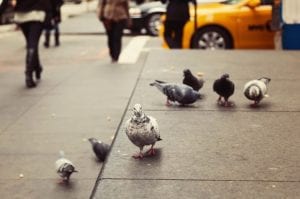
by johnnymarin | Feb 5, 2019 | Pigeon Patrol's Services
 Pigeon droppings were a contributing factor to an infection which led to a child’s death at Scotland’s flagship hospital.
Pigeon droppings were a contributing factor to an infection which led to a child’s death at Scotland’s flagship hospital.
The child died at Glasgow’s Queen Elizabeth University Hospital and a post-mortem found that they had inhaled fungus which is primarily found in pigeon droppings.
Another patient was also infected but it is thought the infection did not contribute to their death.
Scottish Health Secretary Jeane Freeman said a review would be carried out in the design, build, handover and maintenance of the flagship hospital.
She told MSPs that traces of pigeon excrement had been found in a top floor room where there was a small crack in the wall which was “invisible to the naked eye”.
The hospital was built for the Scottish Government at a cost of £842 million and opened at the end of April 2015.
Despite the hospital having only recently been constructed, Ms Freeman said there appeared to be a “number of instances” where the fabric of building was “less than satisfactory”.
After visiting the hospital, the Scottish health secretary said: “I have agreed a review, with external expert advice, that will look at the design of the building, the commissioning of the work, the construction of the building, the handover of the building and the maintenance of the building, in order to ensure we identify where issues were raised that should have been addressed and where maintenance programmes now should be perhaps more robust or more frequent.”
Ms Freeman announced the review after setting out “clear factual points” on the two patient deaths to MSPs at Holyrood.
She said the Cryptococcus bacteria had initially been identified in one patient in November 2018 but was not linked to that person’s death the following month.
Ms Freeman added: “In December a post-mortem of a child who has passed away conformed that Cryptococcus was both present and a contributory factor in their death.”
She explained the second case triggered the introduction of additional infection control measures by NHS Greater Glasgow and Clyde, including prescribing anti-fungal medication to “vulnerable patients” and the provision of additional air filters.
“I am confident the board have taken all the steps they should to ensure and maintain patient safety,” she said.
Labour health spokeswoman Monica Lennon said the public would be “shocked” to learn one of those who had died was a child as she claimed there had been a “complete lack of clarity” from the health board about the infection.
Ms Lennon said: “I think the people of Scotland will feel it is absolutely extraordinary that in a modern hospital, Scotland’s flagship and apparently super hospital no less, we have a situation where pigeons and infections can kill patients.
“If this unthinkable and deadly infection can happen at the flagship Queen Elizabeth, what is to stop it happening at other hospitals?”
About Pigeon Patrol:
Pigeon Patrol Products & Services is the leading manufacturer and distributor of bird deterrent (control) products in Canada. Pigeon Patrol products have solved pest bird problems in industrial, commercial, and residential settings since 2000, by using safe and humane bird deterrents with only bird and animal friendly solutions. At Pigeon Patrol, we manufacture and offer a variety of bird deterrents, ranging from Ultra-flex Bird Spikes with UV protection, Bird Netting, 4-S Gel and the best Ultrasonic and audible sound devices on the market today.
Voted Best Canadian wholesaler for Bird Deterrent products four years in a row.
Contact Info: 1- 877– 4– NO-BIRD (www.pigeonpatrol.ca)
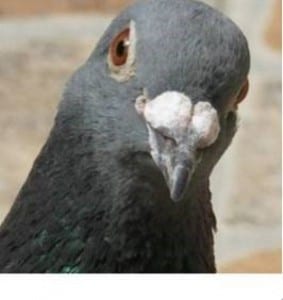
by johnnymarin | Feb 4, 2019 | Pigeon Patrol's Services
 In just a few weeks, an Alberta man and a pigeon that showed up at his ranch have become inseparable.
In just a few weeks, an Alberta man and a pigeon that showed up at his ranch have become inseparable.
Greg and Maureen Germscheid say the pigeon, which Greg calls Pidge, first flew onto their property last September.
“He looked so terrible when he came here,” Maureen Germscheid told CTV Edmonton.
Their concern grew through the fall, as Pidge continued to show up at the ranch near Entwistle, Alta. A few weeks ago, Greg decided to pick up the pigeon. When the bird didn’t resist or struggle, he says, a bond was formed.
The Germscheids soon found themselves amazed by Pidge’s quirks and seeming intelligence. The bird responds to mentions of its new name and seems eager to accompany Greg on his tractor and the occasional sleigh ride.
About Pigeon Patrol:
Pigeon Patrol Products & Services is the leading manufacturer and distributor of bird deterrent (control) products in Canada. Pigeon Patrol products have solved pest bird problems in industrial, commercial, and residential settings since 2000, by using safe and humane bird deterrents with only bird and animal friendly solutions. At Pigeon Patrol, we manufacture and offer a variety of bird deterrents, ranging from Ultra-flex Bird Spikes with UV protection, Bird Netting, 4-S Gel and the best Ultrasonic and audible sound devices on the market today.
Voted Best Canadian wholesaler for Bird Deterrent products four years in a row.
Contact Info: 1- 877– 4– NO-BIRD (www.pigeonpatrol.ca)

 There are some weird things that happen in Florida – after all, that is the foundation of the entire Florida Man subReddit, so is it really that shocking that a video has surfaced of a man catching pigeons in a net? Probably not for most.
There are some weird things that happen in Florida – after all, that is the foundation of the entire Florida Man subReddit, so is it really that shocking that a video has surfaced of a man catching pigeons in a net? Probably not for most.




